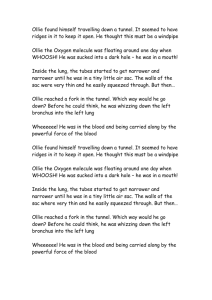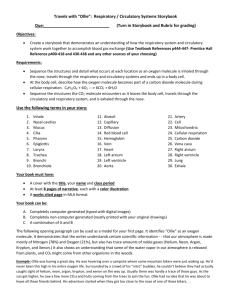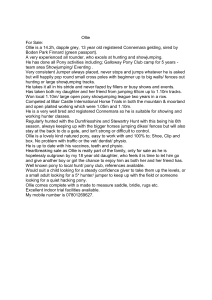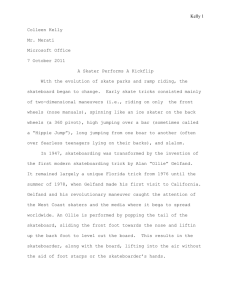Case Study Prada Willi Syndrome
advertisement
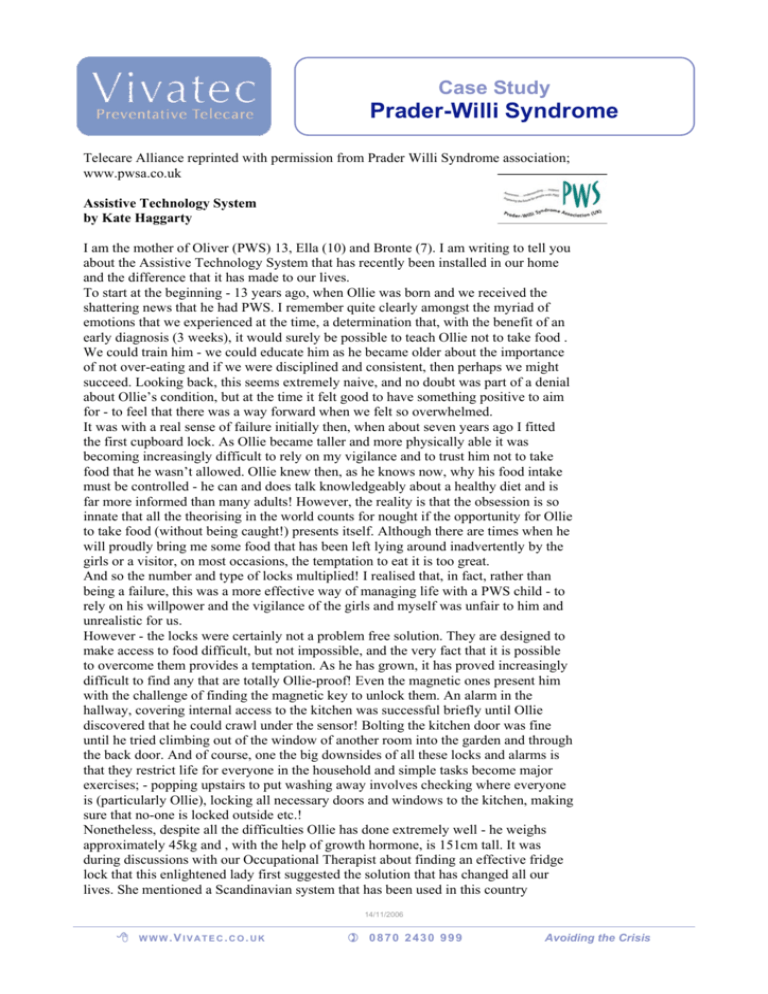
Case Study Prader-Willi Syndrome Telecare Alliance reprinted with permission from Prader Willi Syndrome association; www.pwsa.co.uk Assistive Technology System by Kate Haggarty I am the mother of Oliver (PWS) 13, Ella (10) and Bronte (7). I am writing to tell you about the Assistive Technology System that has recently been installed in our home and the difference that it has made to our lives. To start at the beginning - 13 years ago, when Ollie was born and we received the shattering news that he had PWS. I remember quite clearly amongst the myriad of emotions that we experienced at the time, a determination that, with the benefit of an early diagnosis (3 weeks), it would surely be possible to teach Ollie not to take food . We could train him - we could educate him as he became older about the importance of not over-eating and if we were disciplined and consistent, then perhaps we might succeed. Looking back, this seems extremely naive, and no doubt was part of a denial about Ollie’s condition, but at the time it felt good to have something positive to aim for - to feel that there was a way forward when we felt so overwhelmed. It was with a real sense of failure initially then, when about seven years ago I fitted the first cupboard lock. As Ollie became taller and more physically able it was becoming increasingly difficult to rely on my vigilance and to trust him not to take food that he wasn’t allowed. Ollie knew then, as he knows now, why his food intake must be controlled - he can and does talk knowledgeably about a healthy diet and is far more informed than many adults! However, the reality is that the obsession is so innate that all the theorising in the world counts for nought if the opportunity for Ollie to take food (without being caught!) presents itself. Although there are times when he will proudly bring me some food that has been left lying around inadvertently by the girls or a visitor, on most occasions, the temptation to eat it is too great. And so the number and type of locks multiplied! I realised that, in fact, rather than being a failure, this was a more effective way of managing life with a PWS child - to rely on his willpower and the vigilance of the girls and myself was unfair to him and unrealistic for us. However - the locks were certainly not a problem free solution. They are designed to make access to food difficult, but not impossible, and the very fact that it is possible to overcome them provides a temptation. As he has grown, it has proved increasingly difficult to find any that are totally Ollie-proof! Even the magnetic ones present him with the challenge of finding the magnetic key to unlock them. An alarm in the hallway, covering internal access to the kitchen was successful briefly until Ollie discovered that he could crawl under the sensor! Bolting the kitchen door was fine until he tried climbing out of the window of another room into the garden and through the back door. And of course, one the big downsides of all these locks and alarms is that they restrict life for everyone in the household and simple tasks become major exercises; - popping upstairs to put washing away involves checking where everyone is (particularly Ollie), locking all necessary doors and windows to the kitchen, making sure that no-one is locked outside etc.! Nonetheless, despite all the difficulties Ollie has done extremely well - he weighs approximately 45kg and , with the help of growth hormone, is 151cm tall. It was during discussions with our Occupational Therapist about finding an effective fridge lock that this enlightened lady first suggested the solution that has changed all our lives. She mentioned a Scandinavian system that has been used in this country 14/11/2006 WWW.VIVATEC.CO.UK 0870 2430 999 Avoiding the Crisis Case Study Prader-Willi Syndrome primarily in care homes where they have Alzheimer’s sufferers. The system requires each patient to wear a wristband which identifies them uniquely and allows a combination of sensors and the computer software to monitor their movement around the home. She wondered whether such a system might be modified to operate in a private household such as ours where knowing the whereabouts of an individual can be vital. And so, an arduous process began. Whilst the company, Vivatec, willingly put forward a proposal for a modified version of the technology with Ollie’s specific needs in mind, securing the necessary funding proved to be quite a battle. However, after eighteen months we were successful and the system has been installed for just over six weeks. What a transformation it has been for us all! It works like this: Ollie wears a ‘Wristcare’, rather like a chunky watch without a face, and there are sensors placed strategically around the house, primarily covering all access to the kitchen. The software to control the system runs from a PC. The moment Ollie crosses the thresholds defined by the sensors, a message is sent to a pager telling me exactly where he is. Unlike other alarms that we have tried, a response is only triggered by the person wearing the Wristcare, rather then any other member of the household, cat or dog etc.! The immediate benefits are obvious and were anticipated ; - I can move freely around the house without having to remember to lock doors I go, the girls can go to the kitchen to get a drink without having to first ask me to unlock a door, I no longer need to think every two minutes "Where’s Ollie and what might he being doing?" - in effect the system has become my eyes and ears. (That being said, it takes a long time to let go of habits acquired over years of being vigilant!) However, the overriding, and most unexpected benefit has been for Ollie himself. Not the fact that his opportunities to take food have been restricted, with the consequent positive impact on his weight management - this was what we hoped for. The biggest change has been in Ollie’s behaviour: as I said earlier, with all the other preventative mechanisms we tried, there remained the possibility of overcoming them and managing to access food. And no matter how small the chance, if it existed, Ollie would try and take advantage of it. It seemed as if much of his waking time was spent working out ways to "beat the system" or take advantage of a momentary weakness in it - and if he succeeded there were the inevitable confrontations. With this system, Ollie knows that the second that he crosses an alarm threshold, I will be alerted - he simply cannot enter an area where he might find food without being detected - and because he knows that he will be caught, he no longer tries, nor spends time watching for an opportunity. As a result he is far happier and relaxed and extremely proud of "the system that helps him" - it is as if , at least whilst he is at home, a huge pressure has been taken off him. I realise that the Vivatec solution may not be either necessary or appropriate for everyone. It certainly doesn’t dispense with the need to teach Ollie how to manage his food intake - much of his life, after all, is spent outside of the home. However, for us as a family and most especially for Ollie as an individual, it has made a tremendous difference to our day to day lives. 14/11/2006 WWW.VIVATEC.CO.UK 0870 2430 999 Avoiding the Crisis
